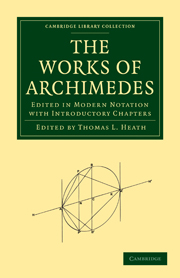Book contents
- Frontmatter
- PREFACE
- LIST OF THE PRINCIPAL WORKS CONSULTED
- Contents
- INTRODUCTION
- CHAPTER I ARCHIMEDES
- CHAPTER II MANUSCRIPTS AND PRINCIPAL EDITIONS—ORDER OF COMPOSITION—DIALECT—LOST WORKS
- CHAPTER III RELATION OF ARCHIMEDES TO HIS PREDECESSORS
- CHAPTER IV ARITHMETIC IN ARCHIMEDES
- CHAPTER V ON THE PROBLEMS KNOWN AS ΝΕΥΣΕΙΣ
- CHAPTER VI CUBIC EQUATIONS
- CHAPTER VII ANTICIPATIONS BY ARCHIMEDES OF THE INTEGRAL CALCULUS
- CHAPTER VIII THE TERMINOLOGY OF ARCHIMEDES
- THE WORKS OF ARCHIMEDES
CHAPTER VII - ANTICIPATIONS BY ARCHIMEDES OF THE INTEGRAL CALCULUS
Published online by Cambridge University Press: 07 September 2010
- Frontmatter
- PREFACE
- LIST OF THE PRINCIPAL WORKS CONSULTED
- Contents
- INTRODUCTION
- CHAPTER I ARCHIMEDES
- CHAPTER II MANUSCRIPTS AND PRINCIPAL EDITIONS—ORDER OF COMPOSITION—DIALECT—LOST WORKS
- CHAPTER III RELATION OF ARCHIMEDES TO HIS PREDECESSORS
- CHAPTER IV ARITHMETIC IN ARCHIMEDES
- CHAPTER V ON THE PROBLEMS KNOWN AS ΝΕΥΣΕΙΣ
- CHAPTER VI CUBIC EQUATIONS
- CHAPTER VII ANTICIPATIONS BY ARCHIMEDES OF THE INTEGRAL CALCULUS
- CHAPTER VIII THE TERMINOLOGY OF ARCHIMEDES
- THE WORKS OF ARCHIMEDES
Summary
It has been often remarked that, though the method of exhaustion exemplified in Euclid xii. 2 really brought the Greek geometers face to face with the infinitely great and the infinitely small, they never allowed themselves to use such conceptions. It is true that Antiphon, a sophist who is said to have often had disputes with Socrates, had stated that, if one inscribed any regular polygon, say a square, in a circle, then inscribed an octagon by constructing isosceles triangles in the four segments, then inscribed isosceles triangles in the remaining eight segments, and so on, “until the whole area of the circle was by this means exhausted, a polygon would thus be inscribed whose sides, in consequence of their smallness, would coincide with the circumference of the circle.” But as against this Simplicius remarks, and quotes Eudemus to the same effect, that the inscribed polygon will never coincide with the circumference of the circle, even though it be possible to carry the division of the area to infinity, and to suppose that it would is to set aside a geometrical principle which lays down that magnitudes are divisible ad infinitum. The time had, in fact, not come for the acceptance of Antiphon's idea, and, perhaps as the result of the dialectic disputes to which the notion of the infinite gave rise, the Greek geometers shrank from the use of such expressions as infinitely great and infinitely small and substituted the idea of things greater or less than any assigned magnitude.
- Type
- Chapter
- Information
- The Works of ArchimedesEdited in Modern Notation with Introductory Chapters, pp. cxlii - clivPublisher: Cambridge University PressPrint publication year: 2009First published in: 1897



